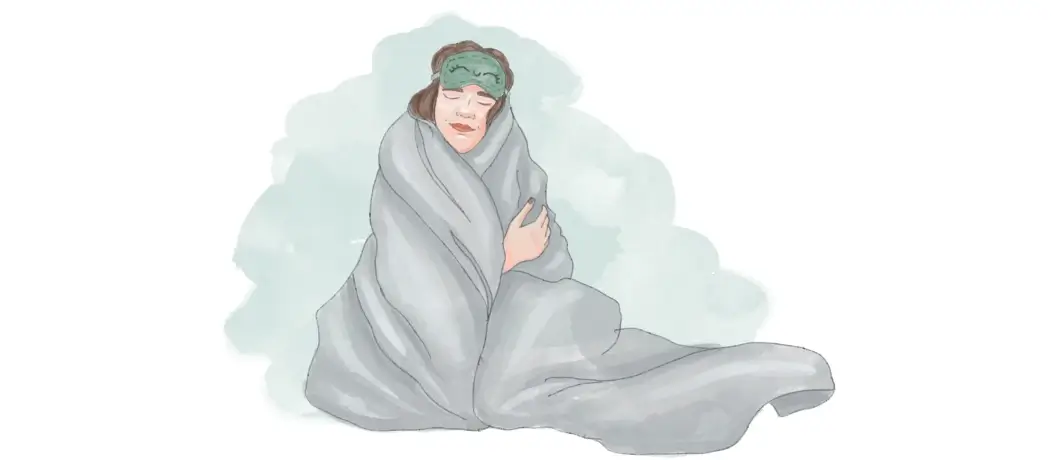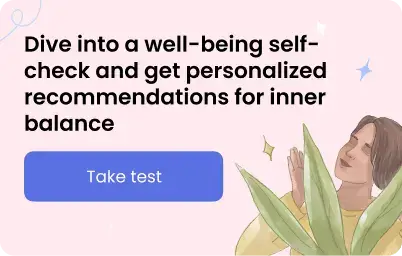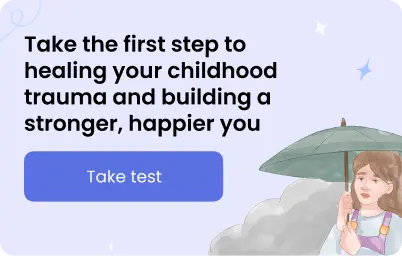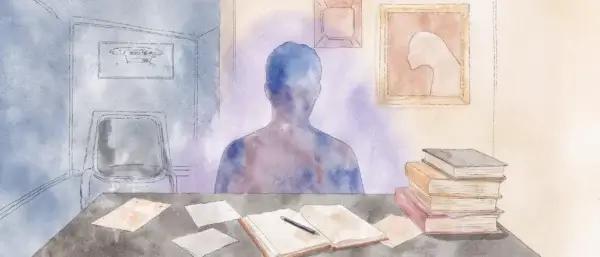Sleep has been established as one of the most important aspects of maintaining a healthy body. There was a 63.98 billion USD market for sleep products globally in 2023. According to experts, the market is projected to reach 108.21 billion USD in ten years. Everything to help us have desired seven to nine hours at night and waking up well-rested.
Still, many people wake up tired, even with plenty of sleep. What might be the causes? Poor sleep quality, stress, underlying mental health conditions, and even blue lights from a screen can all cause tiredness and lack of energy in the morning.
Let’s explore why we might wake up tired.
You can always take this Breeze test to gauge your well-being and understand why you are waking up exhausted and restful sleep.
Why do I wake up tired? When counting sheep doesn’t help
We’ve summarized the 8 most common causes behind waking up tired and feeling weak in the morning:
- Poor quality of sleep
- Sleep inertia
- Blue light from screens
- Poor sleep hygiene
- Drinking too many stimulating beverages
- Stress
- Poor mental health
- Sleep disorders
1. Poor quality of sleep
Your brain goes through different sleep stages. There are two main types: REM (rapid eye movement) sleep and non-REM sleep, which has four stages. The process begins with nodding off, progresses through two phases of lighter sleep, and finally reaches deep, restorative sleep in stages three and four.
Most of these important stages happen in the first part of the night, showing how crucial early sleep time is for rest. These early stages help with memory, managing anxiety, and repairing your body, challenging the idea that only REM sleep, which happens later, matters.
Waking up tired despite enough sleep can be due to disruptions in sleep cycles, such as waking up during deep sleep or poor sleep quality caused by stress, sleep disorders, or irregular sleep schedules.
So, if your sleep is interrupted by outside factors or your body wakes up during the sleeping stages, it prevents your body be well-rested, making you feel tired even after 10 hours of sleep.
Tip: To avoid waking up tired in the morning and have uninterrupted sleep, you should exercise on most days of the week. However, it’s not recommended to exercise before sleep. Studies say that working out within an hour of bedtime can disrupt sleep, making you feel weak in the morning. [1]
2. Sleep environments
Not many of us believe that a bed can impact our rest, but this is the main factor. An uncomfortable mattress or pillow can make it hard to get cozy and feel relaxed. Finding what works for us can be a great investment in our sleep.
Besides your bed, environmental factors can also affect your sleep quality. Your capacity to fall asleep can be disrupted by a number of factors, including temperature, light, noise (such as traffic, neighbors, or television), and the food or drink you consume in the hours leading up to bedtime.
Tip: To ensure a good night’s sleep without disrupting the crucial first stages of sleep, make your bedroom cool, dark, and quiet. Use blackout curtains, earplugs, and an eye mask if needed.
3. Sleep inertia
Sleep inertia is a temporary disorientation and a decrease in performance and/or mood that occurs upon awakening from sleep, as per the Centers for Disease Control and Prevention (CDC). In simple words, it’s a groggy feeling right after waking up.
Typically, it lasts 15 to 60 minutes and sometimes even a few hours. Experts think it might be a protective mechanism to keep us asleep during unexpected wake-ups. [2]
The symptoms of sleep inertia, such as waking up exhausted, wanting more sleep, having trouble thinking clearly or paying attention, and struggling with memory, are strongest right after waking up and ease off as time passes. They can happen after a long sleep or naps longer than half an hour.
Tip: Sleep specialists recommend using gentle alarms, keeping to regular wake-up times, and exposing yourself to natural light (or a special lamp if you live in a mostly dark area) to combat morning sleep inertia.
4. Poor sleep hygiene
The circadian rhythm, the body’s internal clock, functions in 24-hour cycles to carry out vital processes and functions. Even after getting a full night’s sleep, you might still feel exhausted if your circadian rhythm is not in sync.
This can happen as a result of shift work, late-night screen use, or irregular sleep schedules. Disruptions to this internal clock can reduce deep, restorative sleep, leading to groggy feelings and daytime fatigue.
Here are a few things that can make it harder to get a good night’s rest:
- Skipping a bedtime routine: Going to bed and waking at different times every day makes our bodies confused and unsettled.
- Napping too long: A quick nap can be refreshing, but long ones can interfere with you feeling sleepy at night, which makes it likely that you’ll wake up pretty much sleepy in the morning.
- Screen time before bed: It’s worth repeating that the blue light from phones and computers can easily make you difficulty falling asleep.
- Staying up too late: According to a new study, going to bed after 1 a.m. may negatively impact mental health. [3] Our bodies thrive on routine, and going to bed at irregular times can confuse our natural sleep rhythms and be a real cause of waking up tired and with no energy.
Tip: Having regular and good sleep hygiene helps prepare us for sleep and for a new day without tiredness. Try a consistent sleep schedule, manage stress through relaxation techniques, and avoid screens before bed.
5. Blue light
Phones, tablets, and TVs have blue lights that suppress melatonin, the sleep hormone, making it difficult to fall asleep and wake up rested. [4]
“Even small amounts of light at night can affect the body because it alters the natural cycle of the dark at night and light during the day,” says Dr. Michael Breus, a psychologist and sleep medicine expert, in his article “How Blue Light Affects Sleep.”
Social media use before sleeping is also a major distraction. Bringing your phone into your bedroom and scrolling before bed makes you less likely to wake up feeling rested. This can happen because of revenge bedtime procrastination, when we deliberately postpone sleep to compensate for the lack of free time during the day.
Tip: Try replacing your screen with alternative bedtime rituals: reading, meditation, or warm decaffeinated tea. This way, your brain will go to rest faster, and your morning will be truly awake.

6. Drinking too many stimulating beverages
Drinking too many stimulating beverages can disrupt sleep by delaying deep sleep (Stage 3) and reducing REM sleep, leading to non-restorative rest.
Coffee
Caffeine, used upon awakening in the morning, is an excellent strategy to help eliminate any leftover tiredness. A cup of coffee can boost energy levels and improve brain processing. Even though caffeine has some positive effects, it can also make you anxious and make it hard to sleep, so it might not be the best choice if you are trying to combat exhaustion in the morning.
Alcohol
We’ve all heard about alcohol’s sleepy reputation. It might seem that way at first, as it helps you fall asleep faster. However, research suggests drinking alcohol disrupts REM sleep, where the body and brain restoration happens. [5] So, even though it feels calming, it might not have a good effect on your sleep, making you feel dehydrated and tired in the morning.
Energy drinks
The same logic holds for energy drinks, which have become increasingly popular. Statistics in the United States show that 33% of people aged 18 to 29 drink energy drinks regularly. [6]
Caffeine, sugar, and guarana combos keep you alert, which is the opposite of what you want. Also, it can leave you feeling anxious and restless, making it challenging to fall asleep.
Consequently, you experience weakness in the morning. So, even an energy drink consumed in the afternoon can disrupt your nighttime sleep, as its effects can persist for 6-8 hours.
Tip: Watch what you eat and drink—avoid energy and caffeinated drinks, big meals, spicy food, and alcohol usage close to bedtime (at least 3 hours before). Caffeine should ideally be avoided at least eight hours before going to bed. In order to reduce the likelihood of tiredness in the morning, it may be helpful to avoid caffeine in the afternoon if your usual bedtime is 10 p.m. Instead, try herbal tea or just still water before sleeping.
7. Stress
Next, stress and sleep are closely linked. Commonly, high stress levels can make it difficult to fall asleep and stay asleep, leading to fatigue the next morning. [7] If stress keeps you up at night, or you sleep only a couple of ours, you will probably be more exhausted and tired the next day.
Tip: Start your day with a 10-minute meditation cocktail, and watch your stress fade and a positive vibe bubble up. Meditation trains you to be a mindful observer of your thoughts, like watching clouds drift by without getting caught in the storm. Gradually, tension loosens, replaced by a calmer, more collected you.
8. Sleep disorders
While good sleep habits are key, sometimes morning fatigue can point to deeper issues like sleep disorders. Here are some common ones:
- Sleep apnea: Waking up gasping for air or feeling choked throughout the night, leaving you exhausted despite sleeping for hours.
- Insomnia: Tossing and turning for what feels like forever, your mind racing instead of drifting off, leading to chronic sleep deprivation and causing you to wake up tired and with no energy.
- Restless Leg Syndrome: Unpleasant leg sensations and an urge to move them can disrupt your bedtime.
- Bruxism: Waking up with a sore jaw or headaches from unconsciously clenching and grinding your teeth through the night.
If you suspect you have a sleeping disorder, don’t hesitate to see a doctor. They can help you determine what’s going on and suggest the proper treatment to improve your sleep and daily energy levels.
9. Poor mental health
Mental health issues can also disrupt sleep, resulting in fatigue the following morning. Insufficient sleep can have a negative impact on the mind.
Research from sleep specialists shows that about 40% of young adults with depression often feel very tired, a condition called hypersomnia. [8] Anxiety and conditions such as post-traumatic stress disorder (PTSD) can also disrupt one’s sleep.
Feeling uneasy about your past and not sure how to stop it? Try Breeze! It’s a safe place to self-discovery and get advice on improving your well-being.
Note: If you’re still having sleep patterns that affect your life see a doctor. There could be a medical issue affecting your sleep. Remember, be consistent and patient as you experiment with different tips to find what works best for you.
What are the effects of sleep on our body?
Here is how a good sleep can make you really well-rested, productive and more happy during the day.
- Heart. When you’re in deep sleep, your heart rate and blood pressure go down, giving your heart time to rest. This is why waking up with no energy can be linked to insufficient sleep, potentially increasing the risk of heart problems. [9]
- Hormones. Generally, your body makes different hormones that affect how awake or sleepy you feel. In the morning, your body releases hormones like cortisol that help you wake up. Some of them follow a 24-hour pattern, which can change as you grow older.
- Brain. Sleep is a powerful tool for your brain. This makes it easier to learn new things and improve long-term memory. If you rest enough, it can be easy to focus and think clearly. [10]
- Immune system & breathing. During sleep, you breathe less. Not enough sleep can make it easier to get sick and worsen breathing problems in people with conditions like asthma, contributing to morning fatigue. [11]
- Metabolism. Your body deals with fat differently depending on the time of day. If you don’t get enough quality sleep, it can affect your “hunger-full” hormones. It also makes it harder for your body to process insulin and makes you eat more. As a result, it can lead to feeling weak in the morning.
Final touch
Feeling tired in the morning and asking, “Why do I wake up exhausted?” might seem like a never-ending cycle, but it’s not forever. With the right tools and a bit of determination, you can beat fatigue.
It might not be easy, but every little step gets you closer to feeling lively and awake. Let’s use this tiredness as a way to make good things happen.
There are also insightful courses, engaging games, and self-learning quizzes. That’s the power of Breeze. Take control of your well-being with Breeze and become a better you, starting today.
FAQ
Why am I tired even after 8 hours of sleep?
Waking up tired and feeling exhausted in the morning is a common problem for many reasons. Even if you’re getting the recommended eight hours of sleep, factors such as sleep quality, sleep environment, and sleep disorders can still leave you feeling tired.
Why do we need to sleep?
The way you feel when you’re awake is connected to what happens during your bedtime. While asleep, your body keeps your brain healthy and maintains your physical well-being. It gives us energy and keeps us focused.
Lack of sleep can lead to long-term health issues over time. It can mess with how well you think, react, work, learn, and get along with others. [13] It can also lead to low mood and depression, causing even more headaches and a vicious cycle of feeling tired after sleeping.
How can I improve my sleep quality if I don’t want to wake up tired?
Improving sleep quality involves creating a conducive sleep environment, maintaining a regular sleep schedule, managing stress, and adopting healthy lifestyle habits. If you’re experiencing persistent sleep issues, consider consulting a healthcare professional.
Should I go back to sleep if I wake up sleepy?
If you wake up feeling sleepy, it’s important to assess the cause. If you didn’t get enough sleep, going back to sleep for a short time may help. Still, if you consistently experience fatigue despite sleeping for 7–9 hours, it may be more beneficial to address health issues rather than attempting to fall asleep.
Sources:
- Stutz J, Eiholzer R, Spengler CM. Effects of Evening Exercise on Sleep in Healthy Participants: A Systematic Review and Meta-Analysis. Sports Med. 2019
- Hilditch, Cassie & Mchill, Andrew. (2019). Sleep inertia: current insights. Nature and Science of Sleep.
- Renske Lok, Lara Weed, Joseph Winer, Jamie M. Zeitzer. Perils of the nighttime: Impact of behavioral timing and preference on mental health in community-dwelling adults, Psychiatry Research, 2024.
- Impacts of Blue Light Exposure From Electronic Devices on Circadian Rhythm and Sleep Disruption in Adolescent and Young Adult Students, Chronobiol Med. 2024.
- Pabon E, Greenlund IM, Carter JR, de Wit H. Effects of alcohol on sleep and nocturnal heart rate: Relationships to intoxication and morning-after effects. Alcohol Clin Exp Res. 2022.
- Consumers of energy drinks in the United States, by age as of September 2024, Statista.
- Bonnet, M., & Arand, D. (2022, April 15). Risk factors, comorbidities, and consequences of insomnia in adults. In R. Benca (Ed.)
- Nutt D, Wilson S, Paterson L. Sleep disorders as core symptoms of depression. Dialogues Clin Neurosci. 2008
- Evbayekha EO, Aiwuyo HO, Dilibe A, et al. Sleep Deprivation Is Associated With Increased Risk for Hypertensive Heart Disease: A Nationwide Population-Based Cohort Study. Cureus. 2022
- Paller KA, Creery JD, Schechtman E. Memory and Sleep: How Sleep Cognition Can Change the Waking Mind for the Better. Annu Rev Psychol. 2021.
- Besedovsky L, Lange T, Haack M. The Sleep-Immune Crosstalk in Health and Disease. Physiol Rev. 2019.
- Acosta MT. Sueño, memoria y aprendizaje [Sleep, memory and learning]. Medicina (B Aires). 2019
Disclaimer
This article is for general informative and self-discovery purposes only. It should not replace expert guidance from professionals.
Any action you take in response to the information in this article, whether directly or indirectly, is solely your responsibility and is done at your own risk. Breeze content team and its mental health experts disclaim any liability, loss, or risk, personal, professional, or otherwise, which may result from the use and/or application of any content.
Always consult your doctor or other certified health practitioner with any medical questions or concerns
Breeze articles exclusively cite trusted sources, such as academic research institutions and medical associations, including research and studies from PubMed, ResearchGate, or similar databases. Examine our subject-matter editors and editorial process to see how we verify facts and maintain the accuracy, reliability, and trustworthiness of our material.
Was this article helpful?





